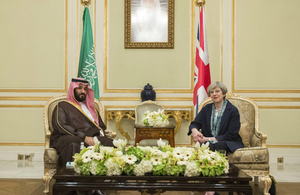Press release: UK charities commit to strengthening safeguarding culture and capability
UK charities have today committed to strengthening their leadership, culture and capacity around safeguarding.
The pledge was made at a summit in London this morning (Tuesday), hosted by the Charity Commission and the Office for Civil Society at the Department for Digital, Culture, Media and Sport. The summit brought charities working in the UK together with their regulators and other agencies, as well as independent safeguarding experts, and focused on setting out the specific safeguarding challenges facing charities working in the UK. It followed a summit on Monday, focused on charities working internationally.
Attendees acknowledged the impact on public trust in charities from the recent revelations around sexual exploitation by individuals involved in international aid agencies. They committed to working together to lead a meaningful response to safeguarding concerns facing the domestic charitable sector, and to achieve the highest standards of safeguarding.
Themes agreed for priority action were:
- leadership, culture and values
- law, regulation and the statutory framework
- capacity and capability in charities around safeguarding and
- responsibilities and reporting, accountability and transparency.
Helen Stephenson, Chief Executive of the Charity Commission, said:
Keeping people safe must be the top priority for all charities, wherever they work and whatever they do – the public, rightly, expect all charities to be safe places for those who come into contact with them. Sadly, concerns about safeguarding in charities are not limited to international aid organisations. Charities working in the UK have their own safeguarding challenges that must be addressed. I am encouraged by the commitment shown today by UK charities to lead and drive improvements around safeguarding. That commitment must be followed by firm action, and we as regulator will work with and support charities in developing practical, workable changes.
Minister for Civil Society, Tracey Crouch, said:
Safeguarding must be at the heart of every charity’s culture and a central priority for its leadership. I have been clear to the sector that they must make safeguarding a key priority. It is crucial that the sector addresses this issue urgently to protect vulnerable people and rebuild the public’s trust.
The summit was chaired by Professor John Drew CBE, former chief executive of the Youth Justice Board, and author of a review into South Yorkshire Police’s handling of child sexual exploitation.
Attendees agreed to develop action plans for each of the themes and reconvene in two months’ time, to commit to implementation and discuss early progress in delivering change. Charity regulators in Scotland and Northern Ireland will be leading their own action plans. This work will feed into a wider safeguarding conference planned for later in the year.
The Charity Commission this week confirmed that reports of serious incidents on safeguarding have nearly doubled since revelations of sexual exploitation by Oxfam staff in Haiti emerged at the beginning of February. The regulator has established a new taskforce to deal with increased serious incident reports, and to undertake proactive work to ensure prompt and full reporting of serious safeguarding incidents by charities. That taskforce is also undertaking a ‘deep dive’ of existing serious incident reporting records to ensure any gaps in full and frank disclosure are identified and responded to.
Ends
Notes to editors:
- The Charity Commission is the regulator of charities in England and Wales; charities in Scotland are regulated by the Office of the Scottish Charity Regulator and charities in Northern Ireland are regulated by the Charity Commission for Northern Ireland. All three regulators took part in the summit.
- Among the charities and organisations attending the UK safeguarding summit were NCVO, ACEVO, SCVO, Association of Chairs, Small Charities Coalition, Scouts Association, Alzheimer’s Society, Barnado’s, Scouts Association, The Children’s Society, Children in Need, NSPCC, Age UK, Big Lottery Fund, Managing Together Ltd, Bond, Children England, the Charity Retail Association.
- On 17 February, the Commission set out a range of new measures on safeguarding.
 Britain’s relationship with one of our oldest friends in the Middle East will begin a new chapter with the visit of Saudi Crown Prince Mohammed bin Salman
Britain’s relationship with one of our oldest friends in the Middle East will begin a new chapter with the visit of Saudi Crown Prince Mohammed bin Salman